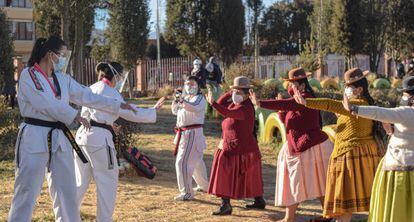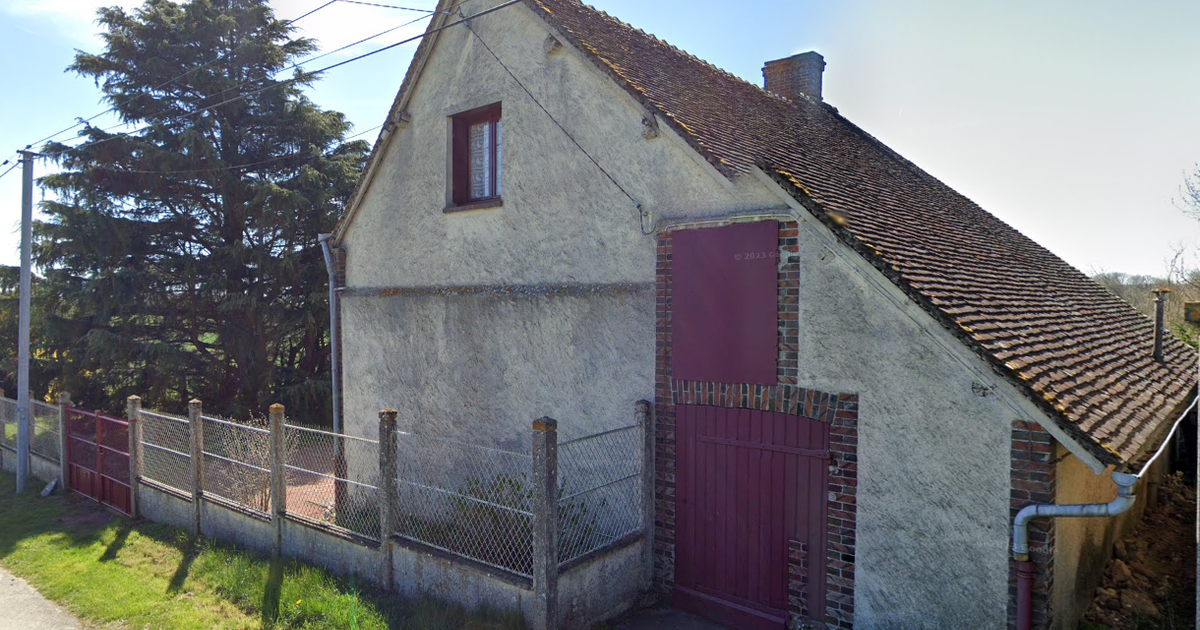Jhesmin Huanca is clear: violence is not resolved with violence, but knowing how to defend yourself can save your life. This Aymara woman from the Bolivian city of El Alto has been learning how to do it for five months from the hand of Warmi Power, a project promoted in 2015 by Laura Roca and Kimberly Nosa, psychologist and trainer, respectively. Both combine psychology and taekwondo in the initiative. But this is not a story of kicks in the air or impossible locks, but of women claiming their right to live without fear.
"We are aware that we should not be offering this type of service," says Nosa in front of the screen, "Unfortunately we live in a macho and misogynistic society, where every day we are raped, killed and our belongings are taken from us."
In 2020, 113 femicides were registered, 108 in 2021, one every three days.
In addition, three out of four Bolivian women acknowledge having suffered violence, according to UN data.
PHOTO GALLERY
Bolivian women learn to defend themselves
At Warmi Power they work on the ability to identify and respond to this violence, outside or inside the home. The flame that serves as their logo was lit seven years ago. Roca, who has been practicing taekwondo for a quarter of a century and is a therapist specializing in sports psychology and social innovation projects, had been working for women's care organizations for some time. During his experience, he says, he noticed that there was no initiative that would teach them to defend themselves or to recognize their rights.
Together with Nosa, a personal development and emotional intelligence advisor and a Taekwondo practitioner for more than 15 years, they presented the project to the Mayor's Office of the country's administrative capital, La Paz.
"We began to work in remote areas, in neighborhoods far from the city, especially with women in
pollera
[traditional skirt worn by the Aymara],"
Rock recounts.
After a year, the Administration withdrew due to budget issues.
"For a political issue, more than anything," they add.
The collaboration with the City Council ceased, but Warmi Power continued.
In Bolivia, with a population of nearly 12 million inhabitants, 108 femicides have been registered in 2021, one every three days
Violence against a woman begins long before the first blow and it is in that margin when her program also begins, which is based on three pillars: personal development, prevention and defense.
"However, we must emphasize that our methodology will be adapted according to the population and the place where we arrive," says Nosa.
It is not the same for girls as it is for adults or for women in rural or urban settings.
"We work on limiting beliefs, self-esteem, self-control, attitude... Everything that comes to be personal development and emotional intelligence," she explains about the first pillar, "so that we get to know each other, so that they themselves know the inner strength they have ”. The second focuses on prevention: "We want women not to engage in physical aggression." The objective is that they can identify a toxic relationship, the different types of violence and reinforce self-care and self-protection. If the line of physical contact has been crossed, the third block, the defense, comes into play. "That's where we also work intensely with Laura [Roca], because they are basic escape techniques," he says.
Laura Roca and Kimberly Nosa, founders of Warmi Power, explain personal self-defense techniques.
Click on the image to see the complete photo gallery.
Warmi Power
These classes help women feel more confident and demonstrate that strength in different spaces.
“At the moment, suddenly, if a person is showing us, I already say 'I'm going to take this technique.'
Maybe sting him in the eyes or hit him in the neck.
I already have that tool to be able to defend myself against an attack at home or on the street,” says Huanca.
"I already know how to react."
Bolivia, which has the highest rate of femicides per inhabitant in South America, has a specific law for cases of gender violence, 348, but its application is far from ideal.
"Here, justice hardly acts as such," says Huanca.
"If they report, the authorities or part of the Special Force to Fight Violence ask them, please, for their children, forgive the husband, to excuse him, not to make any kind of complaint."
Roca highlights a certain impunity.
“The laws are not clear, there are many loopholes.
They go free and, with that permission of knowing that nothing is going to happen to you if you rape or kill, it keeps happening.”
Last year, in collaboration with several lawyers and once the Government opened the corresponding process, they sent a proposal so that Law 348 contemplates self-defense.
I have that technique of being able to defend myself against an attack at home or on the street.
I already know how to react
In a society in which machismo is fashionable even culturally, Roca believes, initiatives like his raise the occasional blister.
Although Huanca has noticed a lot of support, including that of his closest environment, he has also seen negative reactions, especially on social networks.
"There are comments that criticize that as women we should not do this," she says.
When they started, Roca and Nosa recall, the communal houses of the shantytowns were full in the first class of the workshops.
"We had a quota for 30, but we ended up with double the attendance," recalls Roca.
In the second, the influx had dwindled.
“We found out that through jokes made among the men themselves, 'now your wife is going to hit you', 'now she's going to be the one in charge'... men forbade women to attend”.
Sometimes they had to talk to the community leader to allow interested women to participate.
The Warmi Power trainings have toured Bolivia three times and have reached more than 20,000 students, half of them indigenous.
“We feel identified because warmi comes from the Aymara language, and means woman.
Power [power in English]
is that force.
In some way, these classes and techniques have been very useful to us to show that we are not afraid in the streets,” says Huanca.
"Our skirts do not prevent us from defending ourselves," he says.
At Warmi Power they work on the ability to identify and respond to this violence, outside or inside the home.
Click on the image to see the complete photo gallery.
Warmi Power
Today Huanca feels like a leader.
Other women recognize her on the street, ask her to indicate movements, tell her that they have been robbed or that their husbands have beaten them.
They have been hearing all their lives that they are the weak ones, internalizing that men are the ones in charge.
"But the opposite has been proven," she says proudly.
"We want more women to see themselves reflected in them and in us so that they can do, not only this, but what they like," says Roca.
Until now, more than the looks of suspicion and male reluctance, the biggest challenge they face to achieve it is economic subsistence.
"We have no support from anywhere," says Roca.
There are companies that support their activity, but it is not a constant flow.
They say that they have been knocking on doors for a long time and that until now there has been no response.
"We have received letters requesting workshops from different provinces and towns and sometimes we feel our hands are tied because we have no resources."
You can follow PLANETA FUTURO on
,
and
, and subscribe
to our 'newsletter'
here
.








/cloudfront-eu-central-1.images.arcpublishing.com/prisa/VXIMLIHA4VDVNNPZBOFFUSXEWM.jpg)
/cloudfront-eu-central-1.images.arcpublishing.com/prisa/3VG35KWHORAZFCS2WL2ZCQF26Q.jpg)





